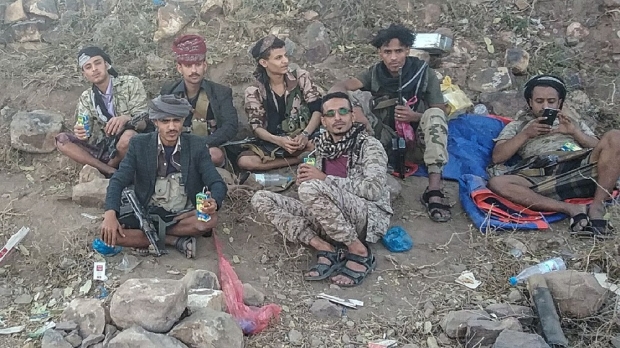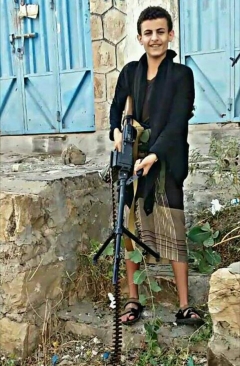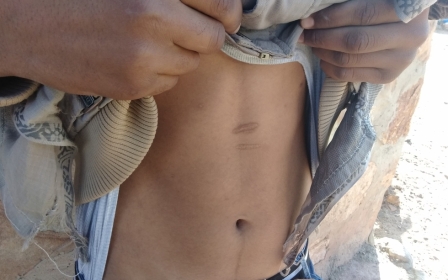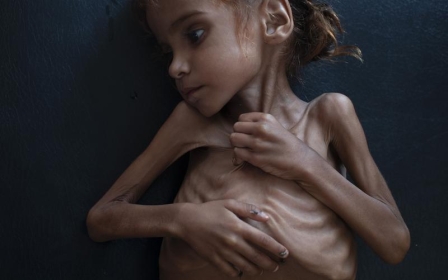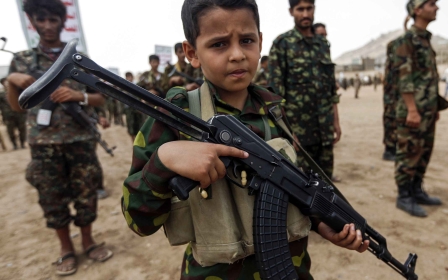The teen warlord who runs Yemen's second city with fear
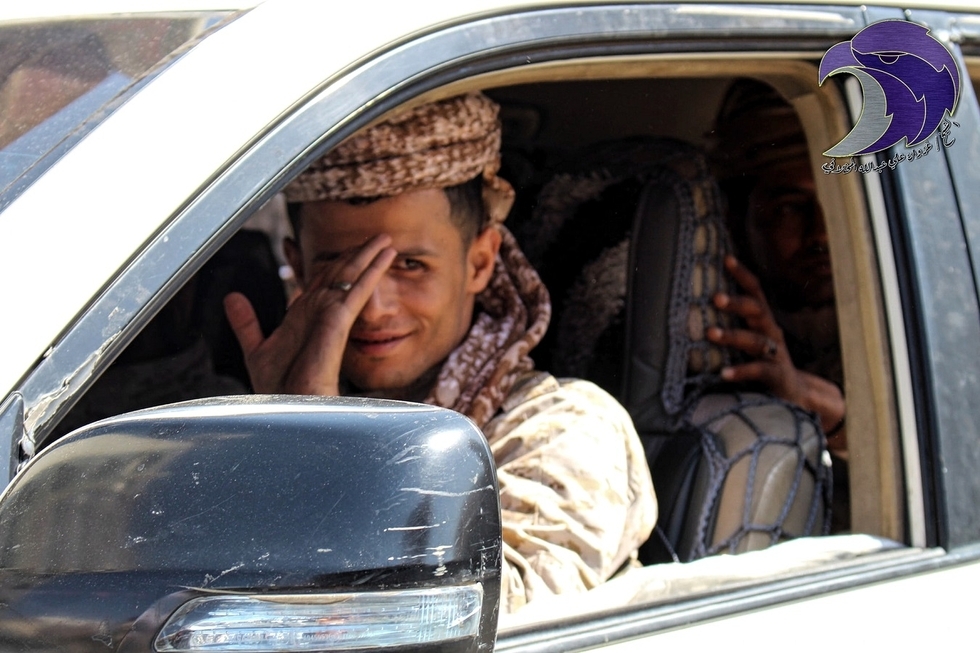
TAIZ, Yemen - He is still a teenager, but he leads hundreds of fighters. He is reckless, but he is also a sheikh who can arbitrate in disputes between adults. He does not have a job, but has amassed wealth through extortion.
This week Ghazwan al-Mekhlafi, not yet 18 but one of the most powerful figures in Taiz, Yemen’s second largest city, proved yet again that he is too powerful to be detained by the police.
At lunchtime on Thursday his fighters were involved in clashes with the city’s military police, part of an ongoing crackdown against militias.
Among those caught up the fighting was a young girl, pictures of whose medical treatment sparked debate.
The military police arrested Mekhlafi later in the day - but by evening he had been released amid fears that further violence might follow his detention.
Following the family
Mekhlafi is perhaps the most extreme example in Yemen of a common feature of the war, the child soldier.
The country's people are desperate as the conflict edges towards the end of its fourth year, with at least 56,000 dead, thousands homeless and millions more facing disease and starvation.
Families are increasingly resorting to desperate measures to survive, including allowing children who are not yet teenagers to head for the battlefront. The young combatants receive a monthly salary, usually 60,000 rials ($100, according to the black market exchange rate at time of publication) - more than the average monthly wage - then send money back home to their families.
Both the Houthi rebels and pro-government forces have been accused of recruiting child soldiers: in March 2017, UNICEF put the number during the previous two years at a minimum of 1,572 boys, some as young as 11. But few, if any, have become military leaders like Mekhlafi at such a young age.
Residents in Taiz are nervous about discussing Mekhlafi out of fear of being targeted. Rafat, one of his former neighbours, knew him before 2015 but did not want to be identified by his real name for reasons concerning his safety.
He said that Mekhlafi had grown up in a military family, had no interest in studying or lawful work, and had been dealing in weapons since he was ten.
"Children usually enjoy playing in the afternoon but this child did not grow up with children. He has grown up with adults," Rafat said.
"They taught him some bad habits like chewing qat (a narcotic) and fighting since he was ten. To be a child and have influence, this is a quality of manhood for Yemeni tribes.”
Mekhlafi first began fighting against the Houthis. The source told MEE: "Mekhlafi joined the Popular Resistance in 2015 when he was in the first year of secondary school. He fought the Houthis on several fronts in Taiz under the leadership of his uncle Sadeq Sarhan.”
Children usually enjoy playing in the afternoon but this child did not grow up with children, he has grown up with adults. They taught him some bad habits like chewing qat and fighting since he was ten.
- Rafat, former neighbour
Sarhan is an influential military leader for the Islah party and the leader of the 22nd Mechanised Brigade. Islah is regarded as a branch of the Muslim Brotherhood in Yemen, even though it changed its name in 1990.
It is opposed to the Houthis as well forces which want independence for south Yemen, which has drawn it into conflict against UAE-backed fighters in Aden.
The Makhlef clan is one of the best known tribes in Taiz. Sheikh Hamoud al-Mekhlafi, founder of the Popular Front in the city, is also part of the family.
After his success against the Houthis, Hamoud was put in charge of the frontline, which runs along 40 Metre Street.
"It is an honour for Taiz residents to see even their children fighting the Houthi militias," a source at his office told Middle East Eye.
Extortion and threats
Ghazwan Mekhlafi stands out from the fighters who often accompany him: he is of slight build and is clean shaven.
Observers suggest that he is between 16 and 17: a source at his office denied that he is 16, but, while confirming that he had finished the third year of secondary school last year, did not give his age.
What is not in dispute is the power that Mekhlafi wields.
Mekhlafi often appears dressed in a ma'awaz and T-shirt, the typical attire of residents of Taiz, with a Kalashnikov slung over his shoulder. If he leaves his house, he is accompanied by a convoy of at least five cars, each vehicle full of fighters.
Aside from being a military commander, he is also a sheikh and has the power to arbitrate in disputes between residents. "Today many people visit Sheik Ghazwan to solve their disputes,” the source in his office said.
But he and his fighters have become notorious in the markets of Taiz for extorting money from the city’s stallholders and shop owners.
A qat seller told MEE: "Mekhlafi's fighters come to the market every day and they collect at least YR1,000 ($1.50) from each seller in the market.” Daily earnings for such a stall would be around YR2,000 or three dollars.
The stallholder said that the sellers dare not oppose Mekhlafi due to his savagery and power, while the local authorities failed to offer any protection.
"No one dares to ask this child where he spends the money,” he said. “Even the government won’t ask him.”
Last year Mekhlafi’s growing power brought him into conflict with Abu al-Abbas, a Salafi leader, who accused him of causing unrest in Taiz and tried to arrest him.
The result was several months of fighting between the two sides, during which dozens were killed and hundreds injured, including civilians. In August, al-Abbas backed down and left with his men to fight in rural areas south of Taiz city.
'All the men died'
Mekhlafi's critics are often afraid to attack him publicly: both international and regional NGOs contacted by MEE declined to discuss his activities. When he is criticised it is often from outside the region.
Fathi Bin Lazraq, the editor-in chief of the Aden-based al-Ghad newspaper, sparked a public debate last week when he said via his Facebook account: "By Allah, this child who is playing with Taiz and its residents is a stigma on the forehead of around four million in Taiz.
“When I see him or hear news about his frivolity with the people in Taiz, an echo inside me says: 'All the men died'."
"To see such a child, with his thuggish mentality, lead a city of great significance like Taiz, by Allah this is a shame against its men and wise men. Is there not one brave man who will stop him?"
Abdul Nasser al-Sadiq, a freelance journalist based in Taiz, said via his Facebook account on Friday:
"By Allah, you [Ghazwan] are the bravest because you proved that all military leaders in Taiz are not qualified to be leaders in a school, much less leaders of the most important city in Yemen."
Rafat said: "The main problem is not that Mekhlafi is a child but it is that Mekhlafi, even before the war, used violence and thugs against the weak.
"All of his neighbours know that this child is supported by the Islahi military leader Sadeq Sarhan and that he looted lands belonging to the weak before the war. Even amid the war he has stormed houses in conflict zones and looted them."
Police: Go back to the frontlines
The military police in Taiz city are responsible for maintaining security and cracking down on militia like Mekhlafi's.
A police source told MEE that the police were committed to fighting militia, be they Salafist or controlled by Mekhlafi. “Mekhlafi should commit to fighting on the frontlines," he said, "or stay in his house, but not to work as a militia in the city.
No one dares to arrest Mekhlafi because he has fighters and they can fight anyone
- Mustafa al-Bukairi, resident
"If he has participated in fighting against the Salafi militia, that does not then mean that he should then be allowed to play the same role as the Salafis."
On Thursday, that commitment brought the police into conflict with Mekhlafi while he was collecting money from the market, leading to his eventual arrest.
But residents correctly predicted that he would be freed.
Mustafa al-Bukairi, a resident of Taiz, said: “No one dares to arrest Mekhlafi because he has fighters and they can fight anyone.”
New MEE newsletter: Jerusalem Dispatch
Sign up to get the latest insights and analysis on Israel-Palestine, alongside Turkey Unpacked and other MEE newsletters
Middle East Eye delivers independent and unrivalled coverage and analysis of the Middle East, North Africa and beyond. To learn more about republishing this content and the associated fees, please fill out this form. More about MEE can be found here.


